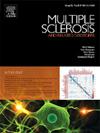阿仑单抗对复发缓解型多发性硬化症患者疲劳、生活质量和患者/护理人员报告的结果的影响——一项真实世界证据研究
IF 2.9
3区 医学
Q2 CLINICAL NEUROLOGY
引用次数: 0
摘要
背景:Alemtuzumab在欧盟被批准用于治疗高活性复发缓解型多发性硬化症(RRMS)。患者报告的结果衡量治疗对生活质量(QoL)的影响,包括疲劳(多发性硬化症(MS)的常见症状)。像多发性硬化症这样的慢性病也会影响病人的照顾者。因此,了解对患者和护理人员的影响对于全面了解MS治疗结果至关重要。方法:这项多中心前瞻性观察性研究评估了三个欧洲国家(丹麦、挪威和意大利)接受阿仑单抗治疗的RRMS患者及其护理人员。研究访问分别在基线、第3、6、12、18、24和36个月(±1个月)进行。主要终点评估阿仑单抗对ms相关疲劳(运动和认知功能疲劳量表[FSMC]评分)的影响。次要终点包括认知(符号数字模态测试[SDMT])、抑郁(贝克抑郁量表第二版[BDI-II])、生活质量(29项多发性硬化症影响量表[MSIS-29])、治疗满意度(药物治疗满意度问卷[TSQM])、工作能力/日常生活活动(健康相关生产力问卷[HRPQ])和临床评估(复发次数、扩展残疾状态量表[EDSS]评分的改善、并且需要再次使用阿仑单抗/任何其他治疗)。探索性终点包括护理者对患者生活质量的感知、护理者生活质量和护理者负担。样本量(N = 80)采用5%显著性水平的双侧t检验。对数据进行描述性分析。安全性也进行了评估。结果:87例入组患者中,72.4% (n = 63)完成了所有随访。在疲劳方面观察到显著改善(p < 0.01),研究结束时(EOS) FSMC评分中位数(min, max)变化为-7.3(-56.0,34.0)个单位,临床相关改善(≥9个单位)在大约12.5个月内被注意到。SDMT(3-5个单位,p 0.05)。除了情绪生活质量增加外,护理人员在基线和EOS报告的生活质量和护理人员负担相似。头痛(51.2%)、发热(44.2%)和皮疹(34.9%)是最常见的不良事件(ae)。除25例严重ae外,大多数ae为轻度或中度。3例患者过早停药,其中1例患者死于与治疗相关的败血症。结论:这项现实世界的研究显示阿仑单抗对疲劳、认知、抑郁、生活质量和治疗满意度有有益的影响。患者残疾的改善和护理人员报告的结果表明患者的生活质量得到改善。本文章由计算机程序翻译,如有差异,请以英文原文为准。
Effect of alemtuzumab on fatigue, quality of life, and patient/caregiver-reported outcomes in relapsing-remitting multiple sclerosis—A real-world evidence study
Background
Alemtuzumab is approved in the European Union for treating highly active relapsing-remitting multiple sclerosis (RRMS). Patient-reported outcomes measure the treatment impact on quality of life (QoL), including fatigue, a common symptom in multiple sclerosis (MS). Chronic diseases like MS also affect the patient's caregiver. Thus, understanding the impact on both patients and caregivers is essential for a comprehensive view of MS treatment outcomes.
Methods
This multi-center prospective, observational study assessed RRMS patients undergoing alemtuzumab treatment, and their caregivers across three European countries (Denmark, Norway, and Italy). The study visits were conducted at baseline, and at Months 3, 6, 12, 18, 24, and 36 (± 1 month). The primary endpoint assessed the effect of alemtuzumab on MS-related fatigue (Fatigue Scale for Motor and Cognitive Functions [FSMC] score). Secondary endpoints included changes in cognition (Symbol Digit Modalities Test [SDMT]), depression (Beck Depression Inventory-Version II [BDI-II]), QoL (29-item Multiple Sclerosis Impact Scale [MSIS-29]), treatment satisfaction (Treatment Satisfaction Questionnaire for Medication [TSQM]), working capacity/daily life activity (Health-Related Productivity Questionnaire [HRPQ]), and clinical evaluation (number of relapses, improvement in Expanded Disability Status Scale [EDSS] score, and need for re-treatment with alemtuzumab/any other treatment). Exploratory endpoints included caregiver perception of patient's QoL, caregiver QoL, and caregiver burden. The sample size (N = 80) was determined based on the 2-sided t-test at 5 % significance level. Data were analyzed descriptively. Safety was also evaluated.
Results
Of 87 enrolled patients, 72.4 % (n = 63) completed all follow-ups. Significant improvement was observed in fatigue (p < 0.01), with a median (min, max) FSMC score change of −7.3 (−56.0, 34.0) units at the end-of-study (EOS), and clinically relevant improvement (≥ 9 units) noted in approximately 12.5 months. SDMT (3–5 units, p < 0.05), BDI-II (median score of 9.5, i.e., no depression, p < 0.01), and MSIS-29 (median change in physical and psychological impact scores -9.2, p < 0.01 and −14.8, p < 0.001, respectively) improved significantly from baseline to EOS. Global treatment satisfaction (p < 0.001), effectiveness (p < 0.05), and side effects (p < 0.05) significant improved exept at EOS, whereas treatment convenience remained same throughout the study. The percentage of patients with at least one relapse was similar each year of the study (10.8–13.2 %). A statistically significant improvement (p < 0.05) in EDSS was reported over time. At EOS, 4.5 % patients needed retreatment with alemtuzumab. Caregivers also reported improvement in patients’ QoL over time, but the median change from baseline (physical and psychological impact scores:10.0 and -14.8, respectively) was not statistically significant (p > 0.05). Caregivers reported similar QoL and caregiver burden at baseline and EOS, apart from an increase in emotional QoL. Headache (51.2 %), pyrexia (44.2 %), and rash (34.9 %) were the most common adverse events (AEs). Majority of the AEs were either mild or moderate, apart from 25 severe AEs. Three patients discontinued prematurely, of which one patient died of sepsis related to treatment.
Conclusion
This real-world study showed beneficial impact of alemtuzumab on fatigue, cognition, depression, QoL, and treatment satisfaction. Improvement in patient disability, and caregiver-reported outcomes indicated enhanced patients’ QoL.
求助全文
通过发布文献求助,成功后即可免费获取论文全文。
去求助
来源期刊

Multiple sclerosis and related disorders
CLINICAL NEUROLOGY-
CiteScore
5.80
自引率
20.00%
发文量
814
审稿时长
66 days
期刊介绍:
Multiple Sclerosis is an area of ever expanding research and escalating publications. Multiple Sclerosis and Related Disorders is a wide ranging international journal supported by key researchers from all neuroscience domains that focus on MS and associated disease of the central nervous system. The primary aim of this new journal is the rapid publication of high quality original research in the field. Important secondary aims will be timely updates and editorials on important scientific and clinical care advances, controversies in the field, and invited opinion articles from current thought leaders on topical issues. One section of the journal will focus on teaching, written to enhance the practice of community and academic neurologists involved in the care of MS patients. Summaries of key articles written for a lay audience will be provided as an on-line resource.
A team of four chief editors is supported by leading section editors who will commission and appraise original and review articles concerning: clinical neurology, neuroimaging, neuropathology, neuroepidemiology, therapeutics, genetics / transcriptomics, experimental models, neuroimmunology, biomarkers, neuropsychology, neurorehabilitation, measurement scales, teaching, neuroethics and lay communication.
 求助内容:
求助内容: 应助结果提醒方式:
应助结果提醒方式:


